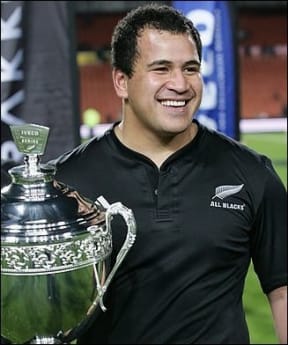
John Schwalger Photo: Supplied
When prop John Schwalger joined the Hurricanes aged 21 in 2004 he learned the challenges he faced on the field were nothing compared to those off it. He suddenly had more aunties and uncles than he knew about and they had their hands out. Many in his Samoan community in Porirua, including the church, expected him to provide financial help. That's where the personal development managers step in.
The Player Development programme was set up by the Rugby Players’ Association in 2001, with support from the New Zealand Rugby Union (NZRU). The aim is to assist players with all aspects of their off-field lives, from education, to finance, contracts, dealing with the media and preparing for life after rugby.
There are 14 personal development managers at franchises around the country. The NZRU said they had made a huge difference to the lives of many players.
Steve Symonds, the Hurricanes’ personal development manager, helps young players withstand the immediate pressures that come from their communities when they first go professional, which includes sorting out their finances.
"Earning and spending lots becomes the norm. With the young group at our academy they think it is OK to spend 200 dollars on a night out at 20 because they are earning so much."
Symonds brings in financial planners and often works with them to clear players’ debts before setting them up for a stable financial future.
He also helps them avoid many of the risks that come from success at a young age, whether it be alcohol and drugs or dealing with the media.
But top of his mind that rugby is a finite career, and much of what he does is about preparing the players for life afterwards. As part of that, Symonds has been getting many Hurricanes players involved in the New Zealand Police Pacific Prevention of Domestic Violence programme.
The players have travelled to Vanuatu, Tonga and Samoa where they talked in schools, prisons and community halls about domestic violence. The players shared their experiences of dealing with anger and stress, and talked directly to the perpetrators of domestic violence.
Symonds said in his view it made them better players.
"They show leadership. It's not quantifiable, but there are a large proportion of boys we've taken on those events and a year later take the next step, they get into the All Blacks. It's not just playing skills, but coach-ability, the ability to learn, listen and understand people".
For Symonds it is about growing good men. Men who are about more than rugby, and contribute to their communities and society as a whole.
He and John Scwhalger have become extremely close over the years. A few years ago Schwalger's best friend was killed in a gang stabbing in Porirua. Despite his grief, Schwalger played a key role in keeping the peace and preventing an all out gang war.
Symonds said he knew then that Schwalger was a leader, and could make a huge difference in his community. Since then Schwalger has been running workshops for young people at risk of joining gangs around the Porirua area.
"He's one of them too, he grew up there, has street cred and community cred, but has respect due to rugby," Symonds said.
He is working with Schwalger, now 31, and nearing the end of his rugby career, on what to do next.
Symonds is convinced it will involve youth work and mentoring.
"He is really special and unique. He knows how to be a good man. He could walk from penthouse to shithouse and get a result"
Steve Symons and John Schwalger talked to Kathryn Ryan on Nine to Noon

